We've uncovered this post pertaining to Common Causes of Water Leaks in the Home listed below on the net and thought it made good sense to discuss it with you over here.

"Be careful of little expenditures. A little leak will certainly sink a terrific ship." - Benjamin Franklin.
He couldn't have actually been a lot more appropriate because water leaks in our homes lead to a waste of resources, boosting our water bills. Although this increase might seem negligible in the beginning, it can cause considerable expenditures that can damage your financial institution. Apart from an increase in costs, water leaks also cause undesirable organic growth, structural damage, and even electric dangers.
Finding out if you have a water leak isn't constantly easy because of being unable to see the majority of the pipework in your home. However, If you have had an increase in your water expenses lately, observed water discolorations on ceilings as well as wall surfaces, smelt lousy smell, and so on. You might want to take into consideration asking for plumbing services to get it had a look at.
There are several root causes of water leaks, and also we have put together the common factors below. Examine to see if you have had associated concerns in your home lately.
Blocked drains pipes
Food fragments, dirt, and also oil can create blocked drains pipes as well as obstruct the passage of water in and out of your sink. Enhanced stress within the rain gutters can finish and also create an overflow up cracking or bursting pipes if undealt with. To avoid clogged drains pipes in your home, we advise you to avoid pouring particles down the tubes and routine cleaning of sinks.
High water pressure
You saw your home water pressure is higher than usual but then, why should you care? It's out of your control.
It would be best if you cared since your typical water stress must be 60 Psi (per square inch) and although your house's plumbing system is created to hold up against 80 Psi. A rise in water stress can put a pressure on your house pipelines and cause fractures, or even worse, ruptured pipelines. If you ever observe that your house water stress is higher than normal, contact an expert concerning regulating it.
Corrosion
As your pipework ages, it obtains weak and also more susceptible to corrosion after the regular passage of water with them, which can gnaw at pipelines and also create fractures. A noticeable indication of deterioration in your home plumbing system is discoloration and also although this might be hard to identify as a result of many pipelines hidden away. Once they are old to guarantee an audio plumbing system, we suggest doing a frequent checkup every couple of years and also transform pipelines
Deteriorated pipeline joints
Pipeline joints are the components of our plumbing system where the pipelines attach. It is vital to keep in mind that even though pipes are designed to withstand stress and last for a while, they weren't made to last for life; as a result, they would weaken over time. An usual indicator of harmed pipe joints is too much sound from taps.
Busted seals
One more reason for water leakages in houses is damaged seals of house devices that utilize water, e.g., a dish washer. When such home appliances are installed, seals are set up around water ports for very easy passage of water through the maker. Hence, a damaged seal can trigger leak of water when in operation.
With little or no understanding of plumbing, recognizing your residence's plumbing system adequate to deal with several of these issues (without repercussion) can be a hassle. Contact plumbing experts in Pittsburgh, Providence, Rochester, as well as environ today, and also they'll make those problems vanish.
He could not have actually been more best since water leaks in our houses result in a waste of resources, increasing our water bills. If you have had a rise in your water costs recently, saw water spots on ceilings and also wall surfaces, scented lousy smell, etc. A rise in water stress can place a strain on your house pipelines and also lead to splits, or even worse, ruptured pipelines. Another cause of water leakages in houses is broken seals of residence appliances that use water, e.g., a dishwasher. When such home appliances are installed, seals are set up around water ports for easy flow of water with the device.
5 TIPS IN DETECTING A WATER LEAK IN YOUR HOUSE
Water leaks can be hard to find in your home, yet they can be so common. We rely on water every day in our home, which is why a leak can cause big problems. By detecting them early, you can save money and further damage, getting the problem fixed as soon as possible. Here are 5 tips to help you detect a water leak in your home, so you can contact a plumber straight away and get the issue sorted.
Check your water meter
Many people underestimate the value of the water meter in their home. It can be one of the best ways to tell if you have a leak early on, so you can get on top of it before issues start arising. Start by turning off all the water in your home: taps, washing machine, dishwasher, etc. Now take a look at the meter – if it’s still changing with everything turned off, it’s likely you have a fast-flowing leak that you need to get on top of straight away. If nothing changes, then leave your meter for an hour or two and come back to it. Did it change in this time? It’s likely you have a slower leak, which isn’t as urgent but still handy to get fixed so it doesn’t become a bigger problem.
Keep an eye on your bill
Another good way to detect a leak in your home is by keeping an eye on your water bill. It helps if you have a past bill from the same period of time. You can compare like for like and determine whether your water usage has increased significantly. If it has, there may be a leak in your system that you haven’t picked up before. A professional plumber can check through all of your pipes and determine where it is coming from.
Look for damage
If you have a leak inside your home, you will notice damage over time. Take a look at your showers and bathtubs and note whether any of the tiles surrounding the area seem to be discoloured or damaged in any way. There may be water stains, mould or peeling material that has resulted from a build up of moisture over time. Make sure you take a look under sinks at the back of cupboards that don’t get accessed regularly. This is where damage can go unnoticed and build up over periods of time.

Do you like reading up on How to Find and Prevent Water Leaks in Your Home? Place a short review further down. We would be pleased to find out your ideas about this posting. In hopes that you visit us again in the near future. Sharing is caring. Helping others is fun. Many thanks for going through it.
Trustworthy fix? Call.
Comments on “The Top 5 Triggers of Water Leaks”